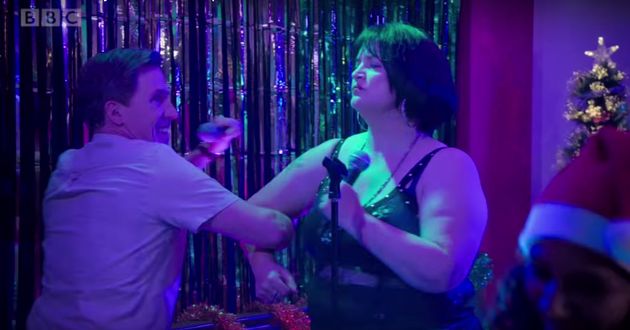BBC called on to stop using ‘homophobic’ terms after defending Gavin & Stacey ‘f****t’ slur

Bryn and Nessa performing the controversial song on the Gavin and Stacey Christmas Special (BBC/YouTube)
A petition is calling on the BBC to stop allowing “homophobic terms” after the public broadcaster defended its decision not to censor “f****t” from the Gavin & Stacey Christmas special.
The BBC comedy divided viewers on Christmas Day, when karaoke duo Bryn and Nessa took to the stage for their “biannual singalong” – but inexplicably opted for an uncensored version of the Pogues’ ‘Fairytale of New York’, which includes the slur “f****t”.
The BBC defended its decision not to censor “f****t”, saying that the ‘Fairytale of New York’ lyrics are “well established”.
Almost 900 people submitted an official complaint about the show.
Viewing figures show that 17.1 million people tuned in to watch the Christmas special, making it the most-watched scripted show of the decade.
Following the unnecessary inclusion of the homophobic slur, people are calling on the BBC to “stop allowing homophobic terms” to be used on its TV and radio channels.
“We, the undersigned, object to the BBC permitting homophobic language being used on BBC TV. We are objecting specifically to the inclusion of the word ‘faggot’ as heard on BBC1 in the Gavin & Stacey Christmas Special on Christmas Day 2019,” the petition begins.
“We feel that the editorial decision to allow this word to be included in the show, has the unfortunate side-effect of ‘normalising’ homophobic terms of abuse, terms that are often used with the intention of harming LGBTQI people and are often used when we are verbally and physically assaulted.
“Furthermore, we feel there is a direct correlation between the normalising of homophobic language in popular culture and the increase in incidents of Hate Speech and Hate Crime in the UK.”
The petition goes on to cite recently released figures, which showed that in London, the number of homophobic hate attacks have risen by 22 per cent in the last year alone
This amounts to more than 50 incidents per week, according to City Hall figures.
“We do not wish to stop anyone’s enjoyment of the original version of the song, indeed, they can download it and listen to it to their hearts content as many times as they like in the comfort of their own homes,” the petition concludes.
“However we do feel that the original version of the song has no place on our national broadcaster, be it on any BBC television channel or on any BBC radio channel.”

